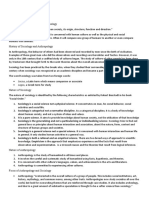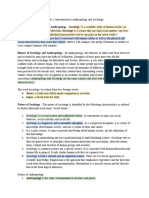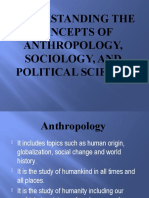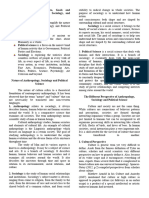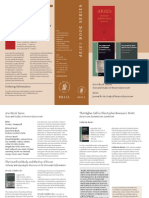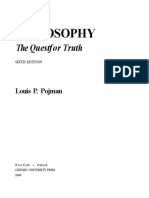0 ratings0% found this document useful (0 votes)
4 viewsLesson 1
Lesson 1
Uploaded by
LeeAnneJoeThis document provides an introduction to concepts related to culture, society, and politics. It defines key terms like identity, culture, and society. It describes how fields of social science like anthropology, sociology, archaeology, and political science contribute to understanding these topics. Important thinkers in each field are discussed, such as Franz Boas in anthropology, Emile Durkheim in sociology, and Plato, Aristotle, Machiavelli, Rousseau, and Montesquieu in political science. The document also explains how factors like gender, sexuality, and nationality influence identity and how identities shape behavior.
Copyright:
© All Rights Reserved
Available Formats
Download as PPTX, PDF, TXT or read online from Scribd
Lesson 1
Lesson 1
Uploaded by
LeeAnneJoe0 ratings0% found this document useful (0 votes)
4 views44 pagesThis document provides an introduction to concepts related to culture, society, and politics. It defines key terms like identity, culture, and society. It describes how fields of social science like anthropology, sociology, archaeology, and political science contribute to understanding these topics. Important thinkers in each field are discussed, such as Franz Boas in anthropology, Emile Durkheim in sociology, and Plato, Aristotle, Machiavelli, Rousseau, and Montesquieu in political science. The document also explains how factors like gender, sexuality, and nationality influence identity and how identities shape behavior.
Copyright
© © All Rights Reserved
Available Formats
PPTX, PDF, TXT or read online from Scribd
Share this document
Did you find this document useful?
Is this content inappropriate?
This document provides an introduction to concepts related to culture, society, and politics. It defines key terms like identity, culture, and society. It describes how fields of social science like anthropology, sociology, archaeology, and political science contribute to understanding these topics. Important thinkers in each field are discussed, such as Franz Boas in anthropology, Emile Durkheim in sociology, and Plato, Aristotle, Machiavelli, Rousseau, and Montesquieu in political science. The document also explains how factors like gender, sexuality, and nationality influence identity and how identities shape behavior.
Copyright:
© All Rights Reserved
Available Formats
Download as PPTX, PDF, TXT or read online from Scribd
Download as pptx, pdf, or txt
0 ratings0% found this document useful (0 votes)
4 views44 pagesLesson 1
Lesson 1
Uploaded by
LeeAnneJoeThis document provides an introduction to concepts related to culture, society, and politics. It defines key terms like identity, culture, and society. It describes how fields of social science like anthropology, sociology, archaeology, and political science contribute to understanding these topics. Important thinkers in each field are discussed, such as Franz Boas in anthropology, Emile Durkheim in sociology, and Plato, Aristotle, Machiavelli, Rousseau, and Montesquieu in political science. The document also explains how factors like gender, sexuality, and nationality influence identity and how identities shape behavior.
Copyright:
© All Rights Reserved
Available Formats
Download as PPTX, PDF, TXT or read online from Scribd
Download as pptx, pdf, or txt
You are on page 1of 44
Lesson 1: Introduction
to culture, Society, and
Politics
At the end of the chapter, you will be
able to:
1. define the concept of identity and relate it to society and culture;
2. define the social sciences and describe its various field of study;
3. discuss how each field of the social sciences contributes to understanding
society, culture, and politics;
4. describe how social backgrounds shape views about society and the
world;
5. analyze social, political, and cultural change, and give examples of each;
6. relate their observations on social differences, social change, and
identities, and discuss their interrelatedness; and
7. demonstrate and interest and willingness to explore the origins and
dynamics of culture, society, and politics
Identity
It is the distinctive characteristic
that defines an individual and is
shaped by one’s membership to a
particular group.
People may have multiple
identities depending on the groups
to which they belong.
Factors that influence identity:
1.Sexual orientation
2.Gender
3.Nationality
Identity can be changed over the
course of a person’s lifetime.
It is continuously shaped and reshaped
through the passage of time as well as
the overall context of one’s life cycle,
including his or her activities within the
society and interaction with other
people.
Identities are important because
they shape both individual and
group behavior as well as people’s
views about other people and
society.
It also helps a person to understand
that identities are relational and
contextual, thereby avoiding the
common pitfall of having misguided
notions or prejudices of other people
that are solely based on one’s
subjective views.
A holistic knowledge and
understanding of the characteristics
and overall identities of one’s self, of
other people, and of different groups
in society can lead to a better world
through constant dialogue and
interaction with each other.
Defined as a society’s way of life,
provides the basis for forging identities.
It allows people to understand
themselves in relation to others and
provides them with a lens through
which they base what is considered the
“right way” of doing things.
Material aspects associated with
culture
clothes
music
food
house
Nonmaterial aspects associated with
culture
Interpretations of other’s behavior
Religion
Ethnicity
Geographical origin
Social class
Society
Refers to a group of people living in a
community.
It is a web of social relationships, which is
always changing. –MacIver and Page
Social Sciences
It is the discipline under which
identity, culture, society, and
politics are studied.
Anthropology
Anthropology is derived from
two Greek words anthropos and
logos, which intensively studies
human and the respective
cultures where they were born
and actively belong to.
Franz Boas
The father of American
anthropology, Franz Boaz, a
physicist, strongly believed that
the same method and strategy
could be applied in measuring
culture and human behavior
while conducting research among
humans including the uniqueness
of their cultures.
Alfred Kroeber and William Henry
Morgan
Two American anthropologists
Alfred Kroeber and William Alfred Kroeber
Henry Morgan, became
prominent in their field since
their specialization included the
championing of indigenous
rights like traditional cultural
preservation and ancestral William Henry Morgan
domain of the American Indian
tribes they intensively studied
Clifford Geertz
Clifford Geertz, an eminent scholar in
the field of cultural anthropology, was
the first and founding professor in the
School of Social Science. He served on
the faculty from 1970 to 2006. Geertz
defined the field of interpretive social
science, and is regarded as one of the
most influential and widely cited
American cultural anthropologists of
the second half of the twentieth
century.
Social Anthropology
Studies how social patterns
and practices and cultural
variations develop across
different societies.
Cultural Anthropology
Studies cultural
variations across different
societies and examines
the need to understand
each culture in its own
context.
Linguistic Anthropology
Studies language and
discourse and how they
reflect and shape different
aspects of human society
and culture.
Biological or Physical Anthropology
Studies the origins of humans
as well as the interplay
between social factors and the
processes of human evolution,
adaptation, and variation over
time.
Archeology
Deals with prehistoric
societies by studying
their tools and
environment.
Sociology
Defined by Anthony
Giddens as “the study of
human social life, groups,
and society.”
Studying sociology is practical and useful.
A social beings, we gain understanding of
how the social world operates and of our
place in it. C.Wright Mills (1959) calls it
sociological imagination which he
defined as “the vivid awareness of the
relationship between private experience
and the wider society.”
Sociology’s point of view is distinct
from other sciences. Peter Berger
explains that the perspective of
sociology enables us to see “general
patterns in particular events”
(Macionis, 2010). This means finding
general patterns in particular events.
The first systematic study on suicide
provides a good example.
Emile Durkheim’s pioneering
study on suicide in the 1800s
revealed that there are
categories of people who are
more likely to commit
suicide.
Emile Durkheim (1864-1920) a French
sociologist who put forward the idea that
individuals are more products rather than
the creator of society; the society itself is
external to the individual. In his book
Suicide, Durkheim proved that social forces
strongly impact on people’s lives and that
seemingly personal event is not personal
after all.
August Comte
August Comte (1798-1857) is the person who
“invented” sociology in 1842, by bringing
together the Greek word socius or
“companion” and the Latin word logy or
“study”. He originally used “social physics” as a
term for sociology. Its aim was to discover the
social laws that govern the development of
society. Comte suggested that there were three
stages in the development of societies, namely
the theological stage, the metaphysical stage,
and the positive stage.
Karl Marx
Karl Marx (1818-1883), a German
philosopher and revolutionary further
contributed to the development of sociology.
Marx introduced the materialist analysis of
history which discounts metaphysical
explanation for historical development.
Before Marx, scholars explain social change
through divine intervention and the theory of
“great men”.
Conflict theory
Max Weber
Max Weber (1864-1920) Weber stressed
the role of rationalization in the
development of society. For Weber,
rationalization refers essentially to the
disenchantment of the world. As science
began to replace religion, people also
adopted a scientific or rational attitude to
the world. People refused to believe in
myths and superstitious beliefs.
Political Science
It is the systematic study of politics, which Andrew Heywood
describes as “the activity through which people make, preserve, and
amend the general rules under which they live.”
It focuses on the fundamental values of equality, freedom, and
justice, and its processes are linked to the dynamics of conflict,
resolution, and cooperation.
Plato
Plato (429?–347 B.C.E.) was a renowned
Western writer and philosopher with wide-
ranging and significant ideas.
he shows his absorption in the political
events and intellectual movements of his time
introduced the idea that their mistakes were
due to their not engaging properly with a
class of entities he called forms, chief
examples of which were Justice, Beauty, and
Equality.
Aristotle
One of the greatest Western intellectuals,
Aristotle (384 BCE—322) was a Greek
philosopher and scientist. He wrote a
philosophical and scientific system that
shaped Christian Scholasticism and
medieval Islamic philosophy. Aristotelian
ideas persisted in Western thought after
the Renaissance, Reformation, and
Enlightenment.
Aristotle
Aristotle’s intellectual range was
vast, covering most of the sciences
and many of the arts, including
biology, botany, chemistry, ethics,
history, logic, metaphysics, rhetoric,
philosophy of mind, philosophy of
science, physics, poetics, political
theory, psychology, and zoology.
Niccholo Machiavelli
Niccolò Machiavelli, (born May 3,
1469, Florence [Italy]—died June 21,
1527, Florence), Italian Renaissance
political philosopher and statesman,
secretary of the Florentine republic,
whose most famous work, The
Prince (Il Principe), brought him a
reputation as an atheist and an
immoral cynic.
Jean-Jacques Rousseau
Jean-Jacques Rousseau, (born
June 28, 1712, Geneva,
Switzerland—died July 2, 1778,
Ermenonville, France), Swiss-
born philosopher, writer, and
political theorist whose treatises
and novels inspired the leaders
of the French Revolution and the
Romantic generation.
Jean-Jacques Rousseau
Rousseau was the least academic and most influential modern
philosopher. His thought ended the European Enlightenment (the
“Age of Reason”).
He revolutionized political and ethical thought. First music, then
other arts, his reforms changed taste. He changed people's lives by
teaching parents to care more about their children and educate
them differently and encouraging emotional expression in friendship
and love.
People who rejected religious orthodoxy adopted the cult of
religious sentiment. He showed them nature's beauty and made
liberty an almost universal goal.
Baron de Montesquieu
A great Enlightenment political
philosopher was Montesquieu.
His naturalistic explanation of the
various kinds of governance and
their reasons, which advanced or
constrained their evolution, was
insatiably interesting and mordantly
amusing.
Baron de Montesquieu
He used this story to show how to prevent government
corruption.
He believed that any government not already autocratic
was at risk of despotism and that the rule of law might
prevent it by dividing power between legislative, executive,
and judicial branches.
This doctrine of separation of powers greatly influenced
liberal political philosophy and the US Constitution's framers.
Thomas Hobbes
Thomas Hobbes (1588–1679),
best known for his political
philosophy, had several interests.
He championed materialist,
nominalist, and empiricist
philosophy against Cartesian and
Aristotelian viewpoints.
Thomas Hobbes
His physics work influenced Leibniz and caused him to
argue with Boyle and early Royal Society experimentalists.
He composed his own Long Parliament history and
translated Thucydides' History of the Peloponnesian War
into English.
He failed at arithmetic, most known for his repeated
attempts to square the circle. Hobbes was a major
intellectual of his time despite that.
John Locke
The most significant
contemporary political philosopher
was John Locke (1632–1704).
In the Two Treatises of
Government, he argued that men
are naturally free and equal against
beliefs that God made everyone a
ruler.
John Locke
He believed that human rights like life, liberty, and
property are independent of society's rules.
Locke used the claim that men are naturally free and equal
to justify legitimate political government as a social contract
in which people in the state of nature conditionally transfer
some of their rights to the government to ensure stable,
comfortable enjoyment of their lives, liberty, and property.
John Locke
Since governments exist by the permission of the people to
preserve their rights and promote the public good, those that fail can
be overthrown.
This makes Locke vital for defending the right to revolution. Locke
also supports majority rule and legislative-executive separation.
Locke disputed that churches should coerce their members or use
coercion to convert individuals to the ruler's religion in the Letter
Concerning Toleration.
In his political writings, Locke expanded on these concepts in the
Second and Third Letters on Toleration.
You might also like
- Sankhyadarsana TeluguDocument213 pagesSankhyadarsana Telugunagasantosh94% (16)
- Absolute CognitionDocument16 pagesAbsolute CognitionAdana BotaNo ratings yet
- Understanding Culture, Society, and PoliticsDocument200 pagesUnderstanding Culture, Society, and PoliticsFenn88% (8)
- Your Character Strengths ProfileDocument3 pagesYour Character Strengths ProfileEricka AbigailNo ratings yet
- CBT Course AnswersDocument34 pagesCBT Course AnswersAvinash ShenoyNo ratings yet
- 2-UCSPThe Scope of Anthropology, Sociology and Political ScienceDocument18 pages2-UCSPThe Scope of Anthropology, Sociology and Political ScienceCarlisle gallardoNo ratings yet
- UCSPDocument6 pagesUCSPMae FernandezNo ratings yet
- UCSP Module Week 1-10Document26 pagesUCSP Module Week 1-10Maricel Bumanglag100% (1)
- UCSP ModuleDocument71 pagesUCSP ModuleJoey HeraNo ratings yet
- Module UCSPDocument71 pagesModule UCSPKarissa100% (2)
- Ucsp Compilation ModulesDocument16 pagesUcsp Compilation ModulesMae SiaNo ratings yet
- Cultural AnthropologyDocument7 pagesCultural AnthropologyRiza GateringNo ratings yet
- Module UCSPDocument69 pagesModule UCSPDennis Raymundo78% (32)
- Module 1: Understanding Culture, Society and Politics-Some Key ObservationDocument71 pagesModule 1: Understanding Culture, Society and Politics-Some Key ObservationAl Cheeno AnonuevoNo ratings yet
- Module 1: Understanding Culture, Society and Politics-Some Key ObservationDocument69 pagesModule 1: Understanding Culture, Society and Politics-Some Key Observationmichael19No ratings yet
- Module UcspDocument72 pagesModule UcspNorombai UttoNo ratings yet
- Ucsp Midterm ReviewerDocument12 pagesUcsp Midterm ReviewerКэндис ЛотброкNo ratings yet
- USCP - 1st QTRDocument27 pagesUSCP - 1st QTRBye Not thisNo ratings yet
- Name of Learner: - Gr/Section - Teacher: Ma. Victoria L. Valenzuela, LPT - DateDocument3 pagesName of Learner: - Gr/Section - Teacher: Ma. Victoria L. Valenzuela, LPT - DateMa Victoria Lopez VaLenzuelaNo ratings yet
- Some Key Observation in Understanding Culture, Society and PoliticsDocument8 pagesSome Key Observation in Understanding Culture, Society and PoliticsJashmin CorzNo ratings yet
- Understanding Culture, Society and Politics-Some Key ObservationDocument8 pagesUnderstanding Culture, Society and Politics-Some Key ObservationJashmin CorzNo ratings yet
- Introduction To Culture, Society and PoliticsDocument16 pagesIntroduction To Culture, Society and PoliticsReynalyn De JesusNo ratings yet
- UCSP-Q3-W1-pptDocument32 pagesUCSP-Q3-W1-pptPeter DizonNo ratings yet
- UCSP Module 1 Quarter 1 (ANSWER KEY 1 and 2)Document4 pagesUCSP Module 1 Quarter 1 (ANSWER KEY 1 and 2)Claire BeethovenNo ratings yet
- ReviewerDocument3 pagesReviewerJISMIN RACHEL LYLE LONGALONGNo ratings yet
- Siociology - An IntroductionDocument24 pagesSiociology - An Introductionabbaschoudhryf21No ratings yet
- Module 1 UCSPDocument46 pagesModule 1 UCSPkikz87% (15)
- Introduction To Understanding Culture, Society and PoliticsDocument27 pagesIntroduction To Understanding Culture, Society and PoliticsAnn Marie Palahang100% (1)
- USCP ModuleDocument69 pagesUSCP ModuleDennis Raymundo100% (1)
- UCSP-Nature, Goals & Perspectives of Anthropology, Sociology and Political ScienceDocument22 pagesUCSP-Nature, Goals & Perspectives of Anthropology, Sociology and Political ScienceJessa Gazzingan100% (6)
- Power Point For UCSP MidTerm - 2 - 070420Document81 pagesPower Point For UCSP MidTerm - 2 - 070420Nelissa Pearl ColomaNo ratings yet
- Intro To Sociology 1Document48 pagesIntro To Sociology 1Myla OrlandaNo ratings yet
- Chapter 1Document47 pagesChapter 1shidan grefaldoNo ratings yet
- OO1 - UCSP - 1st MidtermsDocument13 pagesOO1 - UCSP - 1st MidtermsJacquesse Mackenzie LicoNo ratings yet
- OO1 - UCSP - 2nd ExamsDocument21 pagesOO1 - UCSP - 2nd ExamsJacquesse Mackenzie LicoNo ratings yet
- Introduction To Sociology and AnthropologyDocument10 pagesIntroduction To Sociology and AnthropologymftaganasNo ratings yet
- Assignment No. 1 UCSPDocument4 pagesAssignment No. 1 UCSPJosef I. de VeasNo ratings yet
- Powerpoint Sir GavinaDocument35 pagesPowerpoint Sir Gavinajecille magalongNo ratings yet
- UCSP Module 1Document9 pagesUCSP Module 1Ia NavarroNo ratings yet
- Soc-Lec ReviewerDocument7 pagesSoc-Lec ReviewerBea Joreen ParagasNo ratings yet
- Lesson 1 Introduction To The Study of Culture, Society, and PoliticsDocument9 pagesLesson 1 Introduction To The Study of Culture, Society, and PoliticsMarkChristianRobleAlmazanNo ratings yet
- Founding Fathers of SociologyDocument31 pagesFounding Fathers of SociologyChelsea RonaldsNo ratings yet
- Occidental Mindoro State College: Republic of The PhilippineDocument3 pagesOccidental Mindoro State College: Republic of The Philippinerosana f.rodriguez100% (1)
- Ucsp Lesson 3 5Document5 pagesUcsp Lesson 3 5britnyapalingNo ratings yet
- What Are Society and CultureDocument21 pagesWhat Are Society and CultureAl LyNo ratings yet
- Sociology TESTDocument9 pagesSociology TESTRicky RoqueNo ratings yet
- 1.the Sociological Perspective: Sociology Is The Scientific Study of Human Society & Social BehaviorDocument25 pages1.the Sociological Perspective: Sociology Is The Scientific Study of Human Society & Social Behaviorfaaiz makhaniNo ratings yet
- SociologyDocument50 pagesSociologyEmmarlone96100% (1)
- Week 001 - Introduction To The Study of Culture, Society and PoliticsDocument42 pagesWeek 001 - Introduction To The Study of Culture, Society and PoliticsMarvie Omillo100% (1)
- Socilogy Basics 1Document4 pagesSocilogy Basics 1Anonymous v5QjDW2eHxNo ratings yet
- Understanding The Concepts of Anthropology, Sociology, and Political ScienceDocument17 pagesUnderstanding The Concepts of Anthropology, Sociology, and Political Sciencejhomalyn100% (1)
- Anthropology, Sociology and Political ScienceDocument3 pagesAnthropology, Sociology and Political Sciencejhomalyn67% (3)
- GGGGDocument4 pagesGGGGJem SonNo ratings yet
- 12 Basic Principles of Sociology and AnthropologyDocument12 pages12 Basic Principles of Sociology and Anthropologyayomidealade727No ratings yet
- 3RD Quarter UcspDocument30 pages3RD Quarter Ucspemmanbonifacio51No ratings yet
- Introduction To SociologyDocument62 pagesIntroduction To Sociologyibrahimlawalpkg3002No ratings yet
- UCSP Module 1Document3 pagesUCSP Module 1Genevieve Macalalay AlmacenNo ratings yet
- WEEK 2-Understanding Culture, Society and Politics-Some Key ObservationsDocument17 pagesWEEK 2-Understanding Culture, Society and Politics-Some Key ObservationsAiz 21No ratings yet
- Intro-to-SociologyDocument61 pagesIntro-to-SociologySunshine C GanteNo ratings yet
- UCSP Dea 1Document3 pagesUCSP Dea 1rbNo ratings yet
- Understanding The Concepts of Anthropology, Sociology and Political ScienceDocument17 pagesUnderstanding The Concepts of Anthropology, Sociology and Political Sciencejhomalyn100% (1)
- Emergence of SociologyDocument24 pagesEmergence of SociologyNoor ChahalNo ratings yet
- Rowett Review - of - J. - Bryan - Likeness - and - Likeliho PDFDocument2 pagesRowett Review - of - J. - Bryan - Likeness - and - Likeliho PDFCarlos AugustoNo ratings yet
- Review of Rajiv Malhotra's Being DifferentDocument2 pagesReview of Rajiv Malhotra's Being DifferentrhapsodysingerNo ratings yet
- Chapter 19, RizalDocument5 pagesChapter 19, RizalCarl Johnave Manigbas Monzon100% (2)
- 認同與關聯Document134 pages認同與關聯Aeewonge121133% (3)
- Studying Groups: Aylen S. Geglao James Alex T. Habaradas PH.D StudentsDocument6 pagesStudying Groups: Aylen S. Geglao James Alex T. Habaradas PH.D StudentsJames Alex HabaradasNo ratings yet
- A - Aries Book SeriesDocument2 pagesA - Aries Book SeriespilgrimNo ratings yet
- Of Mathew Arnold " and Anarchy": CultureDocument10 pagesOf Mathew Arnold " and Anarchy": CultureSomit SrivastavaNo ratings yet
- Words of Shree Anandamayi MaDocument174 pagesWords of Shree Anandamayi MaAshutosh KumarNo ratings yet
- Critical Thinking 9-16Document17 pagesCritical Thinking 9-16chelseeNo ratings yet
- Architecture and ObjectsDocument240 pagesArchitecture and ObjectsSheikh Mizanur RahmanNo ratings yet
- Joyce's Loss of FaithDocument9 pagesJoyce's Loss of FaithRichard SouthardNo ratings yet
- Vaisheshika School of Hindu PhilosophyDocument5 pagesVaisheshika School of Hindu PhilosophyShivamNo ratings yet
- Montessori-Based Learning: Sacred Heart of Jesus Montessori School J.R. Borja Extension, Gusa, Cagayan de Oro CityDocument8 pagesMontessori-Based Learning: Sacred Heart of Jesus Montessori School J.R. Borja Extension, Gusa, Cagayan de Oro CityGalindo JonielNo ratings yet
- Mary Shepherd PDFDocument56 pagesMary Shepherd PDFMarcela B. Tavares100% (1)
- Caribbean Feminist Theory LectureDocument4 pagesCaribbean Feminist Theory LectureGaryDanielsNo ratings yet
- What Is Faith - J. Gresham MachenDocument161 pagesWhat Is Faith - J. Gresham Machenf.asare375No ratings yet
- POJMANqftDocument670 pagesPOJMANqftBimboNo ratings yet
- MODULE 1 - Motivated and Non-Motivated Functions of ArtDocument1 pageMODULE 1 - Motivated and Non-Motivated Functions of Artadrian ricañaNo ratings yet
- Emile DurkheimDocument12 pagesEmile DurkheimSaurabh JambhulkarNo ratings yet
- The BIG Thinkers: Leaving Certificate Politics and SocietyDocument5 pagesThe BIG Thinkers: Leaving Certificate Politics and SocietyManzar khanNo ratings yet
- Why Facts Don T Change Our MindsDocument9 pagesWhy Facts Don T Change Our MindsGeorge Herbert Mody100% (1)
- Jonardon Ganeri_ - Virtual Subjects, Fugitive Selves _ Fernando Pessoa and his philosophy (2020, OUP Premium) - libgen.liDocument178 pagesJonardon Ganeri_ - Virtual Subjects, Fugitive Selves _ Fernando Pessoa and his philosophy (2020, OUP Premium) - libgen.liStny krglNo ratings yet
- Lambros Malafouris - Material EngagementDocument10 pagesLambros Malafouris - Material EngagementCaetano Sordi100% (1)
- Muhammad Shamil Basayev - Literary CriticismDocument2 pagesMuhammad Shamil Basayev - Literary CriticismSamil BasayevNo ratings yet
- Senior Management in Police Leadership Are Comprehensive of The Procedures, Regulations, and Customs Related To Policing Leadership DevelopmentDocument45 pagesSenior Management in Police Leadership Are Comprehensive of The Procedures, Regulations, and Customs Related To Policing Leadership DevelopmentInternational Journal of Innovative Science and Research TechnologyNo ratings yet
- Intelligence and WisdomDocument20 pagesIntelligence and WisdomcacaNo ratings yet







